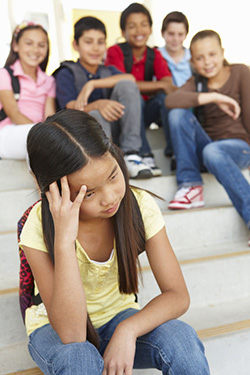Bullying is repetitive, deliberate, and hurtful behaviour, aimed at causing harm to another person. If your child is being bullied, they may not tell you. Find out how to spot the signs of bullying and get help for your child.
Spot the signs of bullying
If you notice these changes in your child, then bullying may be involved:
- signs of anxiety, like headaches, tummy aches, tearfulness, or panic breathing
- not wanting to go school or feeling sick in the morning
- becoming upset, withdrawn, and unhappy
- losing self-confidence
- not doing as well at school
- feeling left out and bad about themselves
- getting nervous about using the internet or their mobile phone.
If you suspect bullying, ask your child if anyone’s being mean to them, or if they feel happy at school. If they start talking, you can find out exactly what’s happening. If not, you can keep asking questions. By continuing to ask, you’re supporting your child and helping them to open up to you.
Listen carefully and make notes
Bullies may kick or hit, use name-calling, exclude someone from their group, tease someone, take someone else’s property, encourage others to join in, and bully through digital technology (cyberbullying).
If your child tells you they’re being bullied:
- listen carefully and encourage them to talk to you about it
- let them know that bullying is not okay and it’s not their fault
- tell them you’re proud of them for telling you – it means they’re standing up for themselves
- write down whatever they tell you about any bullying – it’s useful to keep specific notes about what’s happened
- talk to them each day after school, to see if there’s a pattern.
Dig into the details
Find out:
- what’s happening
- why they think it’s happening
- who’s involved
- when it started
- where it happens
- when and how often it’s happening
- who saw it
- if it’s repetitive
- how they’re dealing with the bullying
- how it’s making them feel.
Contact your school
If you see a repetitive pattern, then act quickly and contact your child’s teacher or school principal. Bullying is unacceptable, so it’s important that they know what’s happening.
Your school will probably have a plan in place to prevent bullying, like the Kia Kaha anti-bullying school-based programme. Education.govt.nz is also distributing a new guide to schools on Bullying prevention and response. This guide, published in May 2015, outlines how schools should assess and respond to different levels of bullying behaviour, including cyberbullying.
You can email your child’s teacher or school principal with your concerns, as it’s good to put your concerns in writing.
- Tell them you think bullying is involved, because the behaviour is repetitive, deliberate, and hurtful.
- State exactly what is happening to your child, how it’s making them feel, when it’s happening, and who’s involved.
- Ask to meet with the teacher as soon as possible, to discuss it.
Get help from your teacher
Meet with the teacher or principal to discuss your concerns. Find out how they deal with bullying and how they can support your child. Stay in touch. Keep going back to the school whenever there’s any bullying, until things improve.
Your teacher can help by:
- encouraging your child to keep talking about any bullying
- investigating the bullying behaviour
- working out how to respond to and stop the bullying behaviour
- setting up a safe place for your child to go, if needed
- separating your child from bullies, where possible
- letting your child know what to do and who to turn to at school, if the teacher is away
- helping to keep your child safe in the playground, as bullying often happens at morning tea and lunch breaks
- working on changing the behaviour of those involved in the bullying
- making sure all students feel that it’s safe to:
- talk about bullying or being bullied
- tell someone when they are bullied or when they see bullying.
Support your child
You can support your child by:
- reminding them it’s not their fault and that they don’t have to put up with bullying
- encouraging them to speak up and always tell you or someone when they are bullied – it’s the best way to stand up for themselves and get help
- talking to your child, often, about what’s happening at school
- helping them to practice what to do when being bullied – ignore the bully, ask the bully to stop, walk away when they can, and tell someone
- making notes of any more bullying behaviour
- reporting any bullying to the teacher or principal each time, until things improve
- letting the school know when things have improved.
If your child is becoming anxious or feeling down, they may need help to deal with the stress of being bullied. Your school’s counsellor can help, or take them to see the doctor, who may refer them to counselling if required. This is a good opportunity for your child to:
- talk to someone who is independent of the school
- learn techniques to improve their confidence and to help them deal with any bullying.
Useful information about bullying
Parents
- Advice for parents about bullying – Education.govt.nz
- Guide for parents – Is my child being bullied? – Ministry of Education
- Cyberbullying information and advice for parents and care givers – NetSafe
- Cyberbullying website – NetSafe
Teens
- Step Up, Be Proud, Be Safe – a pamphlet written by secondary school kids to help teens to help break the bullying cycle
Schools
- Bullying prevention and response – Guide for schools – Education.govt.nz
- Kia Kaha anti-bullying school-based programme – Information for parents/whānau – NZ Police








